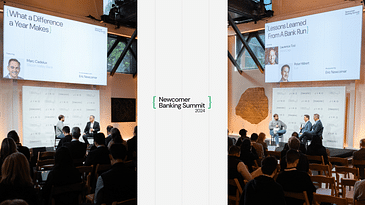We’ve got two great sessions from the Newcomer Banking Summit for you:
* First up, WestCap Group founder Laurence Tosi and Lux Capital co-founder Peter Hébert. They give an unvarnished account of the collapse of Silicon Valley Bank with the benefit of hindsight. “It was like the banking equivalent of the U.S. withdrawal from Afghanistan,” Hébert said. “It was absolute sheer terror.”
* We follow that up with Silicon Valley Bank President Marc Cadieux, who talks about where SVB is today and fields questions about all the new competition his reconstituted bank, now owned by First Citizens, is facing.
I thought Tosi and Hébert’s talk was the spiciest of the day. And Cadieux was the man of the hour. I wanted to know where his head was at one year after the crisis.
You can give the episodes a listen or watch them on YouTube.
Breaking the Bank: BCV’s Matt Harris
If you missed it, yesterday I published a talk from Bain Capital Ventures’ Matt Harris.
In the headline, I made a mortifying error and used the acronym of another VC firm. Harris is Bain Capital Ventures’ fintech guru; he gave a great presentation and I had nightmares last night about my mixup. Apologies!
Here’s that talk:
Get full access to Newcomer at www.newcomer.co/subscribe



